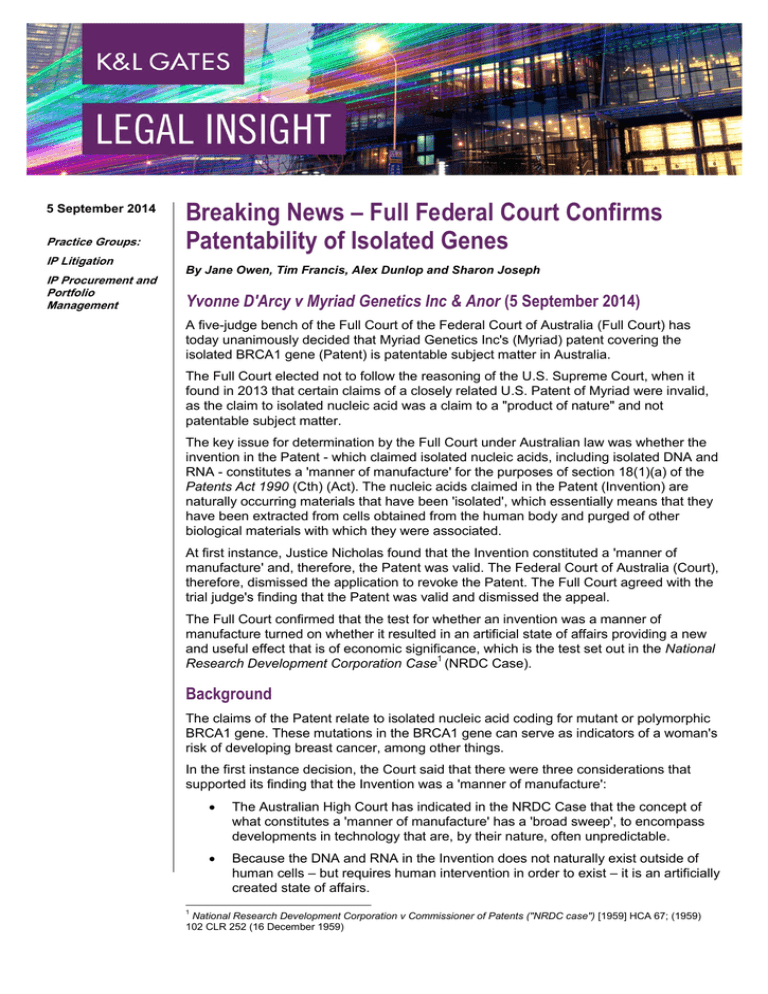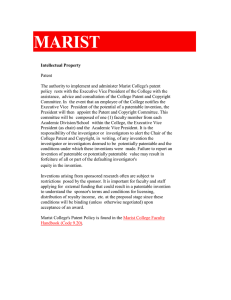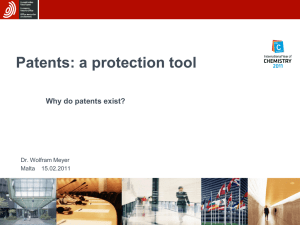Breaking News – Full Federal Court Confirms Patentability of Isolated Genes
advertisement

5 September 2014 Practice Groups: IP Litigation IP Procurement and Portfolio Management Breaking News – Full Federal Court Confirms Patentability of Isolated Genes By Jane Owen, Tim Francis, Alex Dunlop and Sharon Joseph Yvonne D'Arcy v Myriad Genetics Inc & Anor (5 September 2014) A five-judge bench of the Full Court of the Federal Court of Australia (Full Court) has today unanimously decided that Myriad Genetics Inc's (Myriad) patent covering the isolated BRCA1 gene (Patent) is patentable subject matter in Australia. The Full Court elected not to follow the reasoning of the U.S. Supreme Court, when it found in 2013 that certain claims of a closely related U.S. Patent of Myriad were invalid, as the claim to isolated nucleic acid was a claim to a "product of nature" and not patentable subject matter. The key issue for determination by the Full Court under Australian law was whether the invention in the Patent - which claimed isolated nucleic acids, including isolated DNA and RNA - constitutes a 'manner of manufacture' for the purposes of section 18(1)(a) of the Patents Act 1990 (Cth) (Act). The nucleic acids claimed in the Patent (Invention) are naturally occurring materials that have been 'isolated', which essentially means that they have been extracted from cells obtained from the human body and purged of other biological materials with which they were associated. At first instance, Justice Nicholas found that the Invention constituted a 'manner of manufacture' and, therefore, the Patent was valid. The Federal Court of Australia (Court), therefore, dismissed the application to revoke the Patent. The Full Court agreed with the trial judge's finding that the Patent was valid and dismissed the appeal. The Full Court confirmed that the test for whether an invention was a manner of manufacture turned on whether it resulted in an artificial state of affairs providing a new and useful effect that is of economic significance, which is the test set out in the National Research Development Corporation Case1 (NRDC Case). Background The claims of the Patent relate to isolated nucleic acid coding for mutant or polymorphic BRCA1 gene. These mutations in the BRCA1 gene can serve as indicators of a woman's risk of developing breast cancer, among other things. In the first instance decision, the Court said that there were three considerations that supported its finding that the Invention was a 'manner of manufacture': 1 The Australian High Court has indicated in the NRDC Case that the concept of what constitutes a 'manner of manufacture' has a 'broad sweep', to encompass developments in technology that are, by their nature, often unpredictable. Because the DNA and RNA in the Invention does not naturally exist outside of human cells – but requires human intervention in order to exist – it is an artificially created state of affairs. National Research Development Corporation v Commissioner of Patents ("NRDC case") [1959] HCA 67; (1959) 102 CLR 252 (16 December 1959) Breaking News – Full Federal Court Confirms Patentability of Isolated Genes It would be a very odd result if a person whose skill and effort culminated in the isolation of a DNA sequence could not be independently rewarded by grant of a patent because the isolated sequence was held to be inherently non-patentable. At first instance the Court did affirm that naturally occurring DNA and RNA as they exist inside the cells of a human body are not patentable. However, it also pointed out that the Court was not required to ask whether a composition of matter is a "product of nature" for the purpose of deciding whether or not it constitutes patentable subject matter. The Full Court has reiterated that view in delivering its reasons in Court, finding that: "…the isolated nucleic acid, including cDNA, has resulted in an artificially created state of affairs for economic benefit. The claimed product is properly the subject of letters patent." Next Steps – Further Appeal Possible Either party may seek special leave to appeal the Full Court's decision to the High Court of Australia. Impact on Gene Patenting Unless this decision is successfully appealed, it will stand to affirm that isolated genetic material of the type in the Patent can be a manner of manufacture capable of patent protection. More broadly, this decision appears to support the proposition that, where human intervention is required to isolate an otherwise naturally occurring substance or organism from its usual surroundings and chemical associations, the isolated material could constitute patentable subject matter. We have also previously written about the first instance decision and its potential impact of this dispute on gene patenting here. Authors: Jane Owen jane.owen@klgates.com +61.2.9513.2327 Tim Francis tim.francis@klgates.com +61.2.9513.2334 Alex Dunlop alex.dunlop@klgates.com +61.3.9205.2062 Sharon Joseph PhD sharon.joseph@klgates.com +61.3.9205.2151 2 Breaking News – Full Federal Court Confirms Patentability of Isolated Genes Anchorage Austin Beijing Berlin Boston Brisbane Brussels Charleston Charlotte Chicago Dallas Doha Dubai Fort Worth Frankfurt Harrisburg Hong Kong Houston London Los Angeles Melbourne Miami Milan Moscow Newark New York Orange County Palo Alto Paris Perth Pittsburgh Portland Raleigh Research Triangle Park San Diego San Francisco São Paulo Seattle Seoul Shanghai Singapore Spokane Sydney Taipei Tokyo Warsaw Washington, D.C. Wilmington K&L Gates comprises more than 2,000 lawyers globally who practice in fully integrated offices located on five continents. The firm represents leading multinational corporations, growth and middle-market companies, capital markets participants and entrepreneurs in every major industry group as well as public sector entities, educational institutions, philanthropic organizations and individuals. For more information about K&L Gates or its locations, practices and registrations, visit www.klgates.com. This publication is for informational purposes and does not contain or convey legal advice. The information herein should not be used or relied upon in regard to any particular facts or circumstances without first consulting a lawyer. © 2014 K&L Gates LLP. All Rights Reserved. 3
![Introduction [max 1 pg]](http://s3.studylib.net/store/data/007168054_1-d63441680c3a2b0b41ae7f89ed2aefb8-300x300.png)

